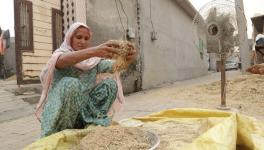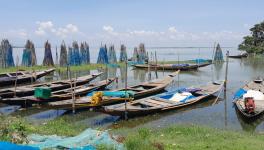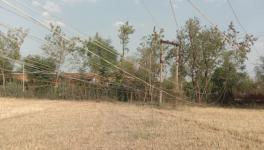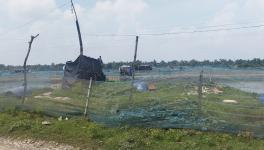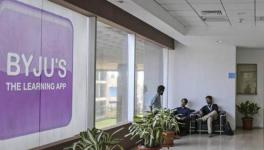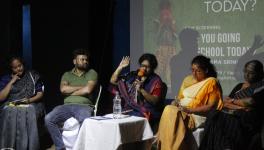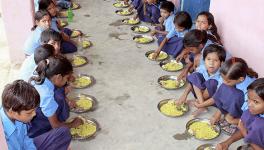Tamil Nadu: Students from Fishing Community Suffering Exclusion Due to Online Education

Representational image. | Image Courtesy: The Wire
Online education, which is being increasingly promoted amid the ongoing pandemic, however, has come as a bane for the marginalised communities. The students from the fishing community in Tamil Nadu, a highly vulnerable section, are facing multiple issues in getting access to education as the government pushes for online means.
With their livelihood dependent on daily wage, the parents of these children are finding it difficult to afford a smartphone and therefore, the students are forced to skip the online classes. Even those students who have access to such platforms are facing problems, including the inability to adapt to the new teaching methodology.
PLEDGING JEWEL FOR SMARTPHONES
The fishing population of the state, with a coastline of over 1000 km, stands at around 10 lakh members. A major section of the community is dependent on daily incomes and an assured income is a rarity. The wages vary as per the day’s catch and the demand for fish in the wholesale and retail market.
The policy note of the Department of Animal Husbandry, Dairying and Fisheries of the government of Tamil Nadu stated that the government earned a foreign exchange of Rs 5,591.49 crore during 2018-19 through marine product exports. But, the community has alleged of lack of attention from the government in spite of its contribution.
The financial status of the large section of the community is so bad that people are forced to pledge and borrow money for buying smartphones for their children. Only a small percentage of the community which owns fishing boats and are involved in marine exports have a better financial capability.
Mohan, a teacher in a private school in the outskirts of Chennai, said, “More than 90% of the students in our school belong to the fishing community. Most of them have purchased smartphones out of compulsion after the online classes began. Parents from very poor financial backgrounds have pledged or even sold the ornaments they owned.”
The ‘new normal’ has made smartphones a necessity at homes of the students, in spite of the reduction in income owing to the pandemic. Possessing of mobile phones alone does not ensure that the model has received acceptance among the students and parents.
STUDENTS SUFFER FATIGUE
The students, accustomed with the traditional black board teaching, are yet to get into terms with the online classes. The issues of network coverage, internet usage limitation also play a role in affecting the students from attending the classes.
“The classes are being held on Zoom or Google meet app for which data requirement is comparatively high. The students are attending 3-4 hours of class everyday. Apart from network issues, data usage is also a problem. The private schools are insisting too much on attendance of the students, who are still struggling to cope up with online classes,” said Nageswari, a mother of two children from Kanyakumari.
Also read: Online Education: Tamil Nadu Students Struggle with Digital Divide
The students from remote areas, too, face similar issues in getting access to the online classes. “Most of the students in our school hail from small fishing hamlets adjacent to Pazhaverkadu. They usually face mobile connectivity issues and even the parents complain of the students not attending the classes due to fatigue. The data limits from the service providers also make an impact in the students attending the classes,” added Mohan.
TELEVISED CLASSES FAR FROM HELPFUL
The classes telecast by the school education department is also far from helpful for the students. The lack of training among teachers has also resulted in far from satisfactory classes.
The teachers of the aided and private schools accept that they too are dependent on these televised classes. The students are asked to attend these classes and report back to the teachers.
“The recorded classes are not interactive which is not helping the students. The grasping power of the students vary and the parents are having a challenging task of making the students understand the subjects. The private schools are relying on such videos and are even conducting exams for the students of even elementary level,” Mohan told NewsClick.
EXCLUSION FROM EDUCATION
Often the children from the fishing community also help their parents in their day to day jobs. From venturing into the sea, transporting fish to nearby markets to selling fish in the market, the students are involved in almost all the activities. The online classes have pushed them out of the system at least for now, though a long term negative impact cannot be ruled out.
Ayesha Nararasan, an academician said that around 80% students within the digital platforms are facing difficulty with the online classes. He further added that only around 25% students of secondary education are attending online classes.
“The remaining 75% of the students are unable to get access to the online classes. The worst could be yet to come as a good percentage of these students may not return to school after reopening. The inclusion of the new terminology 'voluntary withdrawal' in the National Education Policy could come in handy to justify the students dropping out from schools,” he added.
The pandemic has forced the parents to seek admission in government schools, thanks to the lack of online classes and payment of fees. Amid this, the Madras High Court permitted the private schools to collect 75% of the total fee for the current academic year, which is unaffordable given the impact of the pandemic.
Get the latest reports & analysis with people's perspective on Protests, movements & deep analytical videos, discussions of the current affairs in your Telegram app. Subscribe to NewsClick's Telegram channel & get Real-Time updates on stories, as they get published on our website.









